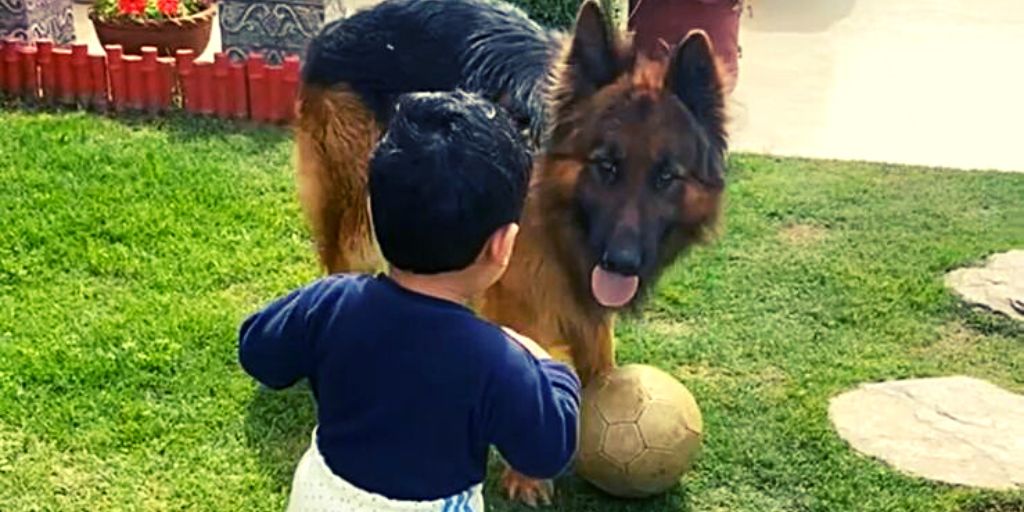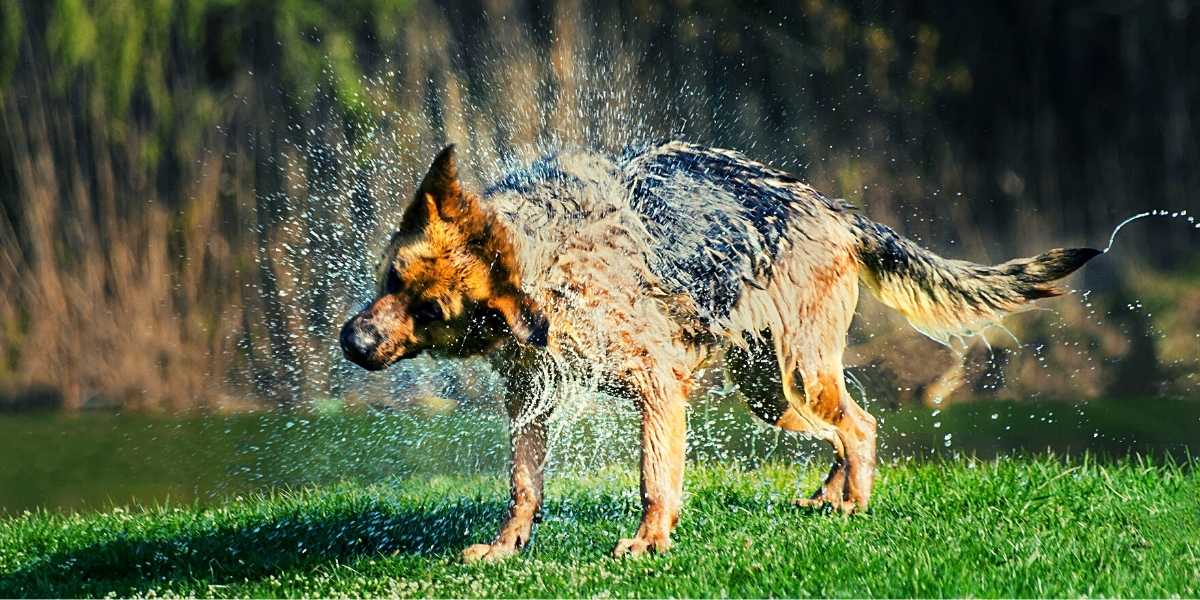
Do you have kids and wonder if a German shepherd is the right dog for your family? Or are you considering getting a German shepherd and want to know what to expect? This blog post will tell you everything you need to know about whether or not German shepherds make good pets for children.
I’ll cover topics such as temperament, exercise needs, and how to introduce a German shepherd pup to kids. So, whether you’re a current or prospective GSD owner, read on for the inside scoop on whether or not these dogs are good with kids!
German Shepherds and Kids – A Perfect Match?
If you’re considering adding a German shepherd to your family, you’re probably wondering if they’re good with kids. After all, German shepherds are loyal, protective, and intelligent dogs that make great family companions.
The answer is that, yes, German shepherds are generally good with kids—but there are a few things you should keep in mind before bringing one home. In this blog post, I’ll explore why German shepherds are good with kids and give some tips for introducing your new dog to your children.
Why German Shepherds Are Good With Kids
German shepherds are loyal, protective, and intelligent dogs that make great family companions. They’re also patient and tolerant, which makes them ideal playmates for kids. Just be aware that German shepherds can be large and energetic, so they may not be best for families with very young children.
If you have small children, teaching them how to interact with dogs safely and respectfully is important. German shepherds are bred as working dogs and have the instinct to protect their pack (i.e., their family). As a result, they may be overly protective of small children if they perceive them as vulnerable.
It’s also important to note that German shepherds need plenty of exercises—preferably at least an hour a day. If they don’t get enough exercise, they may become bored or destructive. This isn’t necessarily a problem if you have an active lifestyle and can take your dog with you on hikes or runs, but it’s something to keep in mind if you live in a smaller space like an apartment.
How to introduce Your German Shepherd To Your Kids
If you already have children in your home, it’s important to introduce them to your new dog slowly and carefully. Start by having your child sit on the floor while you hold the dog on a leash. Allow them to pet the dog gently under the chin—never on the head or back—and give the dog time to sniff them before moving on.
Over time, you can gradually increase the amount of time your child spends around the dog and allow them to feed it treats or play fetch together. Supervising all interactions between young children and dogs is important until you’re confident that both parties are comfortable with each other.
The Pros of German Shepherds as Family Dogs
1. They’re protective.
One of the most common reasons people get German shepherds is for protection. And it’s no wonder why; these dogs are fiercely loyal to their families and will do whatever it takes to keep them safe. A German shepherd is a good choice if you’re looking for a dog to deter burglars and strangers.
2. They’re intelligent.
German shepherds are notoriously intelligent dogs, which means they’re easy to train. This is a major plus if you have young children in the house who need to be supervised around the dog. With proper training, a German shepherd can learn to behave around kids and become a gentle playmate.
3. They’re active.
German shepherds need a lot of exercises, which means they’re perfect for families who like to spend time outdoors. If you have an active lifestyle, a German shepherd will be with you, eager to go on hikes, runs, or swims. Just make sure you have enough energy to keep up with them!
The Cons of German Shepherds as Family Dogs
1. They’re protective (to a fault).
While it’s great that German shepherds are protective of their families, this trait can also be problematic. If not properly trained and socialized, these dogs can become aggressive toward strangers, including other family members or friends who come over to visit. This is something you’ll need to be careful of if you have small children in the house.
2. They need plenty of attention (and exercise).
As I mentioned, German shepherds are extremely active dogs who need plenty of attention and exercise. If you’re not prepared to give them the time and energy they need, they may become destructive or start acting out in other ways.
3. They shed (a lot).
One downside to owning any furry animal is the amount of shedding that comes with it. German shepherds are no exception; they’re known for shedding quite a bit throughout the year. If you’re not prepared to deal with dog hair on your furniture and clothes, then a German shepherd may not be the right breed for you.
Safety Tips for Families with German Shepherds
1. Proper socialization is key.
As I mentioned, it’s important to socialize your German shepherd from a young age so they learn how to behave around people and other animals. Without proper socialization, these dogs can become aggressive and may not be safe around small children.
2. Training is a must.
Because of their protective nature, German shepherds need to be properly trained to know who (and what) is allowed in the home and who (and what) isn’t. This will help keep your family safe and prevent your dog from becoming aggressive toward strangers.
3. Don’t leave your dog unsupervised with children.
Even if your German shepherd is well-trained and socialized, it’s still important to supervise interactions between the dog and small children. This will help prevent accidents and ensure that everyone stays safe.
4. Keep up with their exercise needs.
As I mentioned, German shepherds are extremely active dogs who need plenty of exercises. If you don’t have the time or energy to keep up with their needs, they may become destructive or start acting out in other ways.
5. Be prepared for shedding.
As I mentioned, German shepherds are known for shedding quite a bit throughout the year. If you’re not prepared to deal with dog hair on your furniture and clothes, then a German shepherd may not be the right breed for you.
How Often you should Bathe a German Shepherd
Conclusion
Whether or not a German shepherd is right for your family depends on many factors, including your lifestyle and living situation. These dogs make excellent companions for active families who have the time and energy to give them plenty of cuddles; however, they may not be ideal for families with small children or those who are looking for a low-maintenance pet. Ultimately, it’s important to do your research before deciding on any breed of dog, as each one has its own unique set of pros and cons when it comes to life as a family pet.
FAQs
Is a German shepherd a good family dog?
German shepherds can make excellent family dogs if they are properly trained and socialized. However, they may not be ideal for families with small children or those who are looking for a low-maintenance pet.
Are german shepherd puppies good with kids?
Yes, German shepherd puppies can be good with kids if they are properly socialized from a young age. It’s important to supervise interactions between the dog and small children, as these dogs can become aggressive if they are not properly trained.
What is the best age to get a German shepherd puppy?
The best age to get a German shepherd puppy is between 8 and 12 weeks old. This is the age when puppies are most impressionable and will benefit the most from training and socialization.
How much exercise does a German shepherd need?
German shepherds are extremely active dogs who need plenty of exercises. If you don’t have the time or energy to keep up with their needs, they may become destructive or start acting out in other ways.
Do German shepherds shed a lot?
Yes, German shepherds are known for shedding quite a bit throughout the year. If you’re not prepared to deal with dog hair on your furniture and clothes, then a German shepherd may not be the right breed for you.





